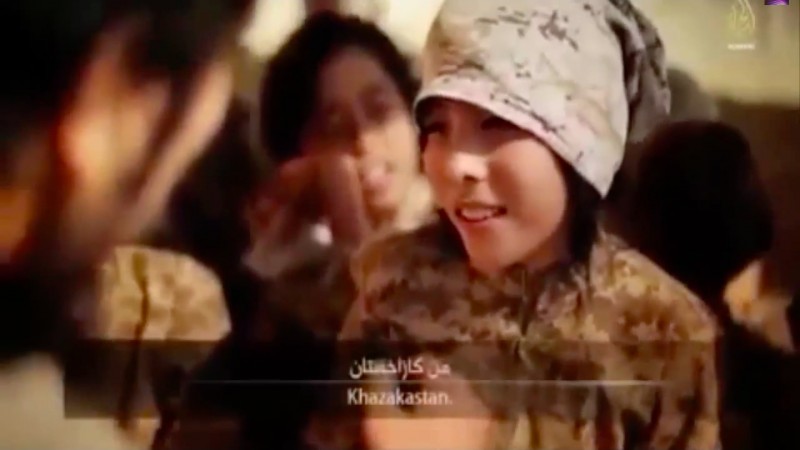
Screen capture from video, widely shared on YouTube.
Weeks after it was published, a news article featuring a video of children training in ISIS camps in the Middle East has been blocked in Kyrgystan. After many days of uncertainty, the country's State Agency of Communications demanded that local Internet service providers (ISPs) block the article from Kloop.kg, a well-regarded independent news outlet. The move is a blow for press freedom in the transitioning democracy and provides further evidence of the pressures journalists living in insecure states face in covering violent extremist groups.
Neighboring Kazakhstan long ago blocked access to the article under a local law enabling censorship of “extremist propaganda”. Now Kyrgyzstan, generally viewed as less autocratic, has followed suit. Entitled “Video of the Islamic State: Children from Kazakhstan Threaten to Kill the Unfaithful,” the article contains “elements of extremism propaganda,” the State Agency of Communications told Kloop.kg on Dec. 10 when justifying the block.
While some ISPs have blocked only the article itself, others, such as Kyrgyztelecom, have blocked the whole website.
 Difficulties for Kloop.kg began Nov. 24, when the website's editorial team decided to repost a video that had appeared Nov. 22 on the website of the British tabloid The Daily Mail. The footage itself, of Kazakh minors talking of jihad and toting kalashnikovs, had already been widely shared online, after being distributed by ISIS’ media arm Al-Hayat.
Difficulties for Kloop.kg began Nov. 24, when the website's editorial team decided to repost a video that had appeared Nov. 22 on the website of the British tabloid The Daily Mail. The footage itself, of Kazakh minors talking of jihad and toting kalashnikovs, had already been widely shared online, after being distributed by ISIS’ media arm Al-Hayat.
A brotherly block?
Kazakhstan's state prosecutor wrote to Kloop the same day asking the outlet to remove the article, citing Kazakh domestic legislation and U.N. Security Council resolution 1373, which compels all states to “take necessary measures to prevent the commission of terrorist acts, including provision of early warning to other States with the help of information exchange.”
When Kloop's editors declined the request, Kazakhstan appealed to Kyrgyzstan's Ministry of the Interior and state prosecutor and asked them to open an investigation. On Dec. 10, Kloop editors received a note from the Kyrgyz State Agency of Communications explaining that local Internet providers had been given until Dec. 12 to block the access to the article, and would otherwise be fined.
Public officials routinely cite security concerns when ordering the blocks, but in this case, it is not clear what threat the article — an informative but innocuous description of a video that was already all over the Internet — actually posed to Kyrgyzstan. On Nov. 28, Ministry of the Interior authorities claimed there were also Kyrgyz citizens in the footage, but offered no proof of this allegation.
Kloop.kg editor-in-chief Eldiyar Arykbaev, who wrote the article, told Global Voices that he and his colleagues could not understand which elements of the reportage promoted extremism:
Мы поговорили с аппаратом Омбудсмена и нам объяснили, что наша статья не имеет элементов пропаганды терроризма на территории Кыргызской Республики, в ней нет мнения автора и там просто говорится о самом факте. И в случае возбуждения уголовного дела, аппарат Омбудсмена будет представлять наши интересы в суде.
We have talked to the Ombudsmen Institute. Their lawyers told us that there are no elements [of the article] propagandising terrorism on the territory of the Kyrgyz Republic, nor is their any opinion on the part of the journalist; the article just presents facts. If a criminal case is initiated, a lawyer from the Ombudsmen Institute will represent Kloop.
How should journalists cover ISIS?
The debate in journalism over how to cover ISIS without inadvertently strengthening the organization's slick propaganda drive has grown more pertinent as the self-styled “Islamic” State — a designation that no state and few Muslims recognize — continues to pump out videos via its Al-Hayat media arm. Central Asian governments, which tend to crack down on the faintest hint of terrorism (or use terrorism as a pretext to crack down on citizens) have received reports of their citizens being killed fighting for radical factions in Syria with understandable unease.
At a Bishkek press event hosted on Dec. 4 by Search for Common Ground, a group dedicated to media coverage of religious issues, an independent Kyrgyz expert in religious affairs, Kadyr Malikov, said he believes that videos such as the one re-posted by Kloop.kg should be accompanied by comments from the state-adjoined Spiritual Administration of Muslims of Kyrgyzstan [Muftiyat]:
Если подобные ролики попадают в руки журналистов, необходимо хотя бы звонить специалисту, Муфтияту, экспертам, чтобы ролик обязательно сопровождался комментарием осуждения. Обычное вывешивание ролика подразумевает достижение цели террористов. В данном видео, они хотели показать, что у них есть следующее поколение, дети, которые придут вслед за убитыми.
When such videos fall into the hands of journalists, they should call specialists, the Muftiyat, experts, to ask for a comment to condemn it. Just publishing the video means that terrorists achieve their goal to intimidate the public through mass media. In this particular video, the terrorists wanted to show the public that they have a next generation, children, who will follow after them once they have been murdered.
In a telephone coversation with Global Voices, Kloop's Editor-in-Chief Arykbaev disagreed with this view:
Согласовывать с ними публикацию, мы считаем неправильно, так как нарушает нашу редакторскую политику. Мы представили факт… Мы, наоборот, призываем МВД обращать внимание на такие проблемы.
To coordinate together with religious experts is in violation of our editorial policy. We simply presented facts… We call on the Ministry of Interior to pay more attention to such problems [children joining ISIS].
At the same event, Bakyt Dubanaev, an officer from Kyrgyzstan's Ministry of Interior and a representative of the Anti-Terrorist Center of the Commonwealth of Independent States, said Kloop's video could help the ISIS recruitment drive:
Такие ролики направлены на поиск жертв. Ими становятся, обычно, две категории лиц. Первое, это люди с ненормальной психикой, которые увидев зверства, творимые террористами, заинтересовываются. И это простые люди, у которых появляется страх беззащитности и паника. Такие ролики направлены на то, чтобы подорвать авторитет правовых органов и показать, что государство не может справиться с ростом экстремизма. И в этом смысле, СМИ – инструмент в руках террористов.
Such videos look to create victims. Usually, these victims are one of two types of people. Firstly, they can be people with a moral disorder who find terrorist atrocities interesting. Secondly, it could be ordinary people who are struck down by fear and panic. These video materials aim to denigrate the reputation of law enforcement bodies and show that a given state is not able to deal with issues like extremism and terrorism. And, in this context, mass media are tools for terrorists.
He also compared distributing extremist videos to distributing rape videos:
Многие из вас могут подумать, мол, что тут такого показать видеоролик? Я разговаривал со своим казахской коллегой вчера и обсуждали этот вопрос. Он мне говорит, вот представь, берет насильник насилует свою жертву, девушку. А потом, чтобы ее опозорить, выставляет ее в Интернет. И журналисты, чтобы показать как мы [Министерство] боремся с изнасилованием, берут и полностью показывают в Интернете как насильник изнасиловал свою жертву. То есть насильник добивается своей цели: насилует и позорит жертву. А журналисты помогают этому насильнику позорить эту девушку. То же самое здесь.
Many of you might think, well, what is the problem in showing a video? I talked with my Kazakh colleague yesterday and we discussed this issue. He said to me, imagine a rapist rapes his victim — a girl. And then, in order to shame her, he puts the video on the Internet. Journalists, willing to show how [police] are failing to fight sexual abuse, cover this video. At this point, the rapist achieves his goal: he rapes and shames his victim. And journalists assist this rapist to disseminate information. It is the same thing here.
In their 2013 Freedom on the Net report, US-based NGO Freedom House notes several attempts by Kyrgyz government bodies to block politically sensitive content or even entire news websites, such as Ferghana.ru in 2011. In 2012, the Prosecutor General’s Office ordered Internet service providers to block access to the controversial “Innocence of Muslims” film trailer on YouTube, and to restrict access to a film festival entry titled “I am Gay and Muslim.”
Kyrgyzstan has long been considered the most open country in Central Asia, a region renowned for unrelenting authoritarianism. The blocking of a reputable and trusted news resource undermines this status and regrettably complements other evidence that the country is falling in line with its neighbours.



